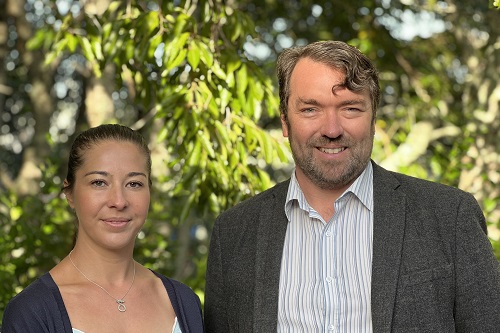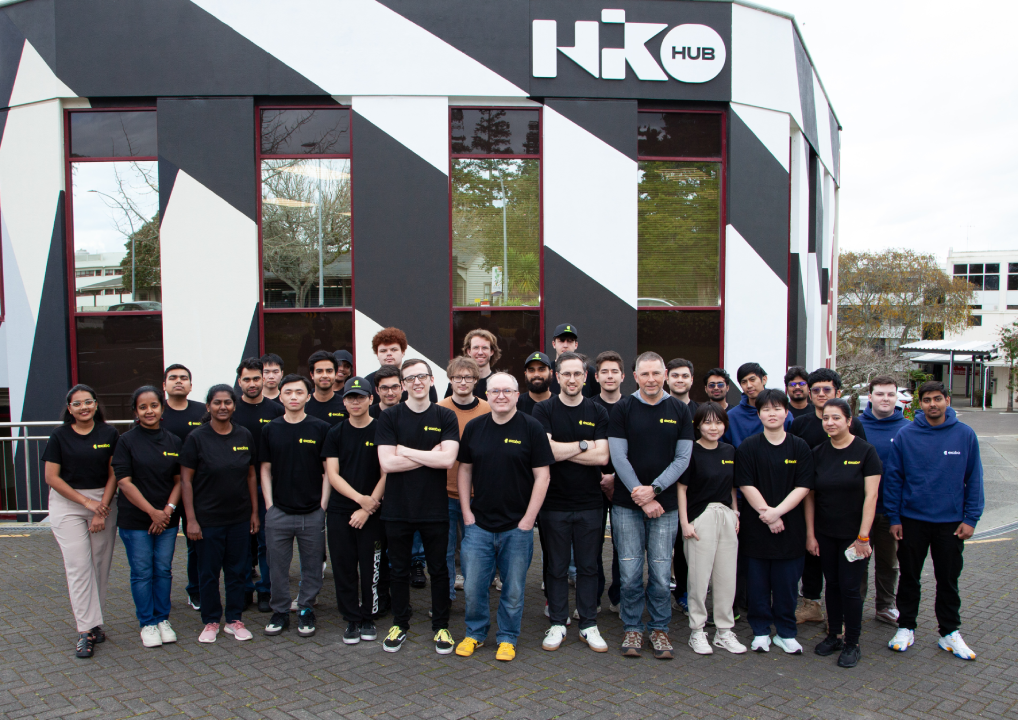Bouncing work back and forth between time zones has allowed research into fetal development to move at a 24hour cycle, thanks to a Marsden grant and dedicated researchers from Aotearoa and England.

Dr. Kirsty Dunn, lecturer in developmental psychology at Lancaster University and University of Waikato Professor Vincent Reid
University of Waikato Professor Vincent Reid received a Marsden Grant for his research in 2020 into development of the human visual system in utero. He recruited Dr. Kirsty Dunn, lecturer in developmental psychology at Lancaster University and the two are pioneering research into fetal development in late-stage pregnancy.
While Professor Reid’s work focuses on sight and Dr Dunn’s is around hearing and language development, the two strands of research are being combined to understand how and when senses form and what that can tell us about what to expect in childhood.
“What we’ve done is take the information we have about infancy research and babies, and adapt it to find out what we can learn from the fetus.
“Because there’s no roadmap for this research, we’re finding so much of the work is setting the parameters and identifying standardised markers for things that have never been done before. Working on opposite sides of the planet has actually been really useful because we’re able to kick ideas and documents back and forth, keeping them in motion,” Vincent says.
“I might work on something all day, then I can send it through to Kirsty and put my head down, and she can progress it from her end ready for me to pick it up again in the morning. I’m not sure I could have done the Marsden without expertise from across the world. The ability to do the work at this speed has been absolutely invaluable.”
The opportunity to work together has been equally rewarding for both researchers, who are in different stages of their career. For Kirsty, having access to Vincent’s experience and networks has been hugely beneficial, while Vincent says the ability to work with people with specific skills and knowledge from across the world is ‘academic gold dust’.
“You end up working with exactly the people you want to work with, and academic success is built on the quality of the team you put together,” he says.
Regular 9am/9pm zoom calls have kept the conversation going and the collaboration rolling, but the opportunity to get together and have a full span of time to dedicate to the research has been invaluable in progressing the work, says Kirsty who has been in Aotearoa for three weeks - a trip that was postponed for two years because of Covid.
“Just having that head space to think, and really get stuck into what we’re doing, has been great,” Kirsty says. “Some of the things we’ve put together just would not have happened if we weren’t in the same place. Having concentrated time, person to person, is invigorating and we’ve produced a lot of writing, very quickly, without the distraction of other, every day things.”
Vincent says the ability to work collaboratively across nations and across disciplines has been a game changer for the research.
“This is psychology, but there’s a medical element to this research and then there’s mathematics and the physics of how light works - getting all these disciplines together is hugely relevant and hasn’t really been done before.
“Working with Lancaster was an obvious choice. It’s one of the best places to do this kind of research in the world and their facilities are almost second-to-none. So with top people over there and the Marsden Grant to let us work on this research here, which is unusual and pushing the boundaries, we’re learning new things every day about fetal behaviour and development.”
Kirsty says the team is having no trouble finding pregnant participants as the study provides a unique opportunity for parents to engage with their unborn babies.
“Mum’s come in and we explain the process to them, and they’re generally quite relaxed when baby moves or reacts, because they feel it all the time. Baby might move when they hear certain sounds, like when Dad comes home, and they might feel a jab in the ribs or something.
“But for Dad’s it’s quite abstract up to that point. What still surprises me is the number of Dads who, when they first see that response from the fetus, get quite emotional. It’s just a really overwhelming moment where they see themselves, for the first time, as Dad. It’s their first proud Dad moment. It’s so special to be able to share that - and learn from it as well.”
- To learn more about our partnership with Lancaster University, and opportunities to get involved visit the partnership website or contact Cath Battersby, Associate Director, Global Engagement and Partnerships.








